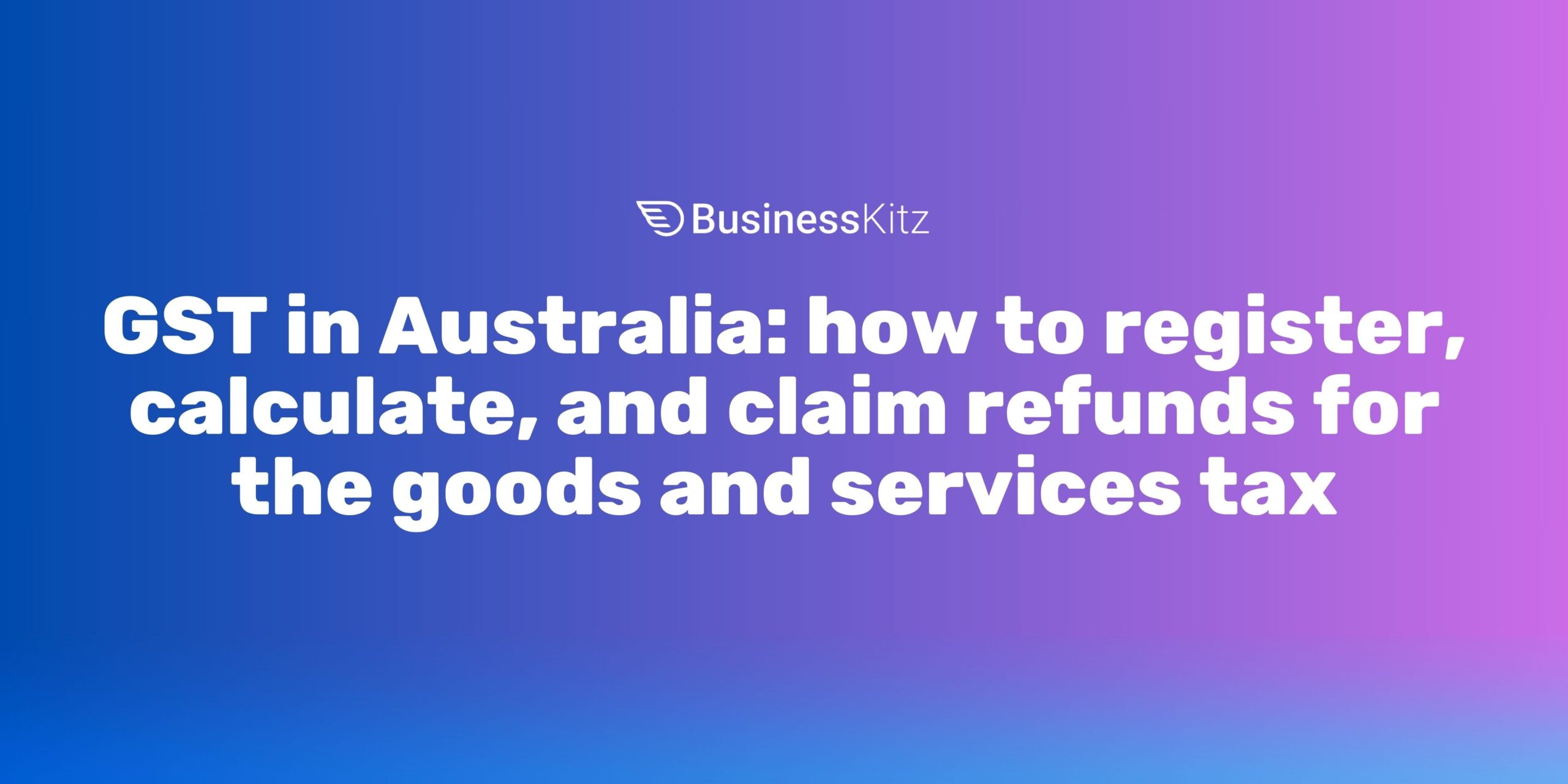
We've helped businesses save $55m with our all-in-one platform. Get instant access to this template and 115+ others, plus AI-powered document creation, starting completely free.
Understanding GST is essential for businesses operating in Australia. It affects pricing, invoicing, tax reporting and compliance. Businesses must know when to register, how to calculate GST correctly and how to claim GST credits. Keeping accurate records and lodging Business Activity Statements (BAS) on time helps avoid penalties.[ez-toc]
Goods and Services Tax (GST) is a 10% tax on most goods and services sold or consumed in Australia. Businesses that meet the $75,000 turnover threshold for GST must register and charge GST on sales, and lodge Business Activity Statements (BAS). Some items like healthcare and basic food are GST-free. Correct GST management ensures businesses stay compliant and avoid penalties.
Goods and Services Tax (GST) is a tax of 10% added to most goods and services sold or consumed in Australia. Businesses that meet the GST turnover (gross income from all businesses minus GST) threshold must register for GST and pay the Australian Taxation Office (ATO) when it’s due.Businesses collect GST from customers at the point of sale. They then report and pay this amount to the ATO through a Business Activity Statement (BAS). GST is one-eleventh of the sale price, meaning businesses must calculate it correctly to avoid errors in pricing and reporting.
Most goods and services sold in Australia have GST included in the price. However, some are exempt.GST applies to:
GST-free items include:
For a full list of GST-free goods and services, visit the ATO's website.
Businesses must know how to calculate GST correctly when setting prices and issuing invoices.ScenarioPrice before GSTGST (10%)Total priceProduct A$100$10$110Service B$200$20$220If GST is already included in the price, businesses can find the GST amount by dividing the total price by 11. This helps them report the correct GST liability to the ATO.Understanding GST ensures businesses charge, collect, and pay the right amount while staying compliant with Australian tax laws.

Businesses must register for GST if they reach the GST turnover threshold. Some businesses must register regardless of turnover. Understanding these rules helps businesses avoid fines and comply with tax laws.
Businesses must register for GST if:
GST turnover is the gross income from all businesses exclusive of GST. Businesses should check their turnover regularly. If they expect to reach the threshold, they must register within 21 days.
Some businesses must register for GST no matter their GST turnover:
A business that does not register when required may face:
Failing to register can result in costly errors. Businesses should register on time to avoid unnecessary penalties and ensure they claim GST credits where applicable.
Businesses that meet the GST turnover threshold must register for GST. Even if a business does not meet the threshold, it may still benefit from registering early. The process is simple and can be done online, by phone or through a tax agent.
Businesses can register for GST through the Australian Business Register (ABR) or the ATO’s Business Portal. The steps are:
Some businesses register for GST before reaching the threshold. Voluntary registration may be useful if a business:
Once registered, businesses must collect GST on sales, lodge BAS and pay the ATO when it’s due.
Businesses must charge and report GST correctly to stay compliant. GST is set at 10% of the sale price. Understanding how to calculate GST ensures accurate invoicing and reporting.
Prices can be GST-inclusive or GST-exclusive. Businesses must state clearly whether GST is included in prices they advertise or quote.
For example, if a product costs $100 before GST, the total price will be $110 after adding GST.
Use these formulas to calculate GST:
Invoice itemGST exclusive ($)GST (10%) ($)GST inclusive ($)Product X$500$50$550Service Y$1,200$120$1,320
Businesses can use online GST calculators or accounting software to avoid errors. Keeping accurate records ensures businesses pay GST correctly and claim GST credits where applicable.Business Kitz GST-registered invoice template can help get you started. Sign up today and get access to over 100 document and contract templates, secure document storage, e-signing and many more features.

Businesses must report and pay GST to the ATO on time. Keeping accurate records and meeting deadlines helps avoid penalties.
Businesses registered for GST must lodge a Business Activity Statement (BAS). This form reports GST collected from sales and GST credits claimed from business expenses. The ATO sends BAS forms based on a business’s reporting cycle.To complete a BAS, businesses must:
Most businesses lodge and pay GST quarterly. Large businesses with a turnover over $20 million must lodge monthly.Payment deadlines:
The ATO charges interest and penalties for late payments. Businesses can avoid these by paying on time or arranging a payment plan.
Businesses struggling to pay the ATO can set up a payment plan. The ATO allows businesses to pay in instalments to reduce financial stress. Businesses can apply for a payment plan online or by calling the ATO.
Businesses must keep records to support their BAS and GST claims. These include:
Records must be kept for at least five years. Keeping organised records helps businesses track GST liability, claim credits correctly and avoid compliance issues.You can securely store and manage you documents in Business Kitz Document vault. Get started today and minimise compliance risks.
Businesses can claim GST credits on certain expenses. Claiming correctly reduces GST liability and ensures businesses do not overpay the ATO.
Businesses can claim GST credits on expenses used for business operations in their BAS statements. These must include GST and have a valid tax invoice.GST credits apply to:
Some expenses do not have GST and cannot be claimed. These include employee wages, loan repayments and bank fees.Expense typeGST claimable?NotesOffice suppliesYesMust have a tax invoiceBusiness travelYesFlights, taxis, hotelsEmployee wagesNoGST does not apply to wages
Businesses should avoid:
Keeping accurate records helps businesses claim the right GST credits and avoid ATO penalties.
International visitors who buy goods in Australia may be able to claim back GST under the Tourist Refund Scheme (TRS). This scheme allows travellers to get a refund on GST paid for goods they take out of Australia. Refunds are processed at Australian airports before departure.
Travellers must meet these conditions to claim a GST refund:
Some items do not qualify for a refund. These include alcohol and tobacco already used, services like accommodation and items used in Australia before departure. Check TRS requirements if you are unsure if your purchase qualifies for a GST refund.
Travellers should become aware of the TRS rules before buying to ensure they meet the conditions.

A business must charge a tax of 10% on most goods or services sold in Australia. The GST amount is one-eleventh of the sale price. If a product costs $110 including GST, the GST amount is $10. Businesses must ensure every invoice issued correctly shows the GST component.
A business needs to register for GST if its turnover reaches $75,000 per financial year ($150,000 for non-profits). If a business is likely to go over this threshold soon, it should register early to stay compliant.
A GST invoice must clearly state whether the total price includes GST. It should show:
Businesses should check invoices are received with the correct GST details before claiming credits.
Yes, businesses can claim GST credits on imports if the goods are used for business. The GST paid at the border can be included in a BAS report. Businesses should keep import records for compliance.
Businesses can find the form to register on the business.gov.au website or through the ATO’s Business Portal. They need an ABN to complete the process.
An electronic distribution platform (EDP), like an online marketplace, may be responsible for collecting and paying GST on sales made through the platform. The business selling through the EDP should check GST obligations with the platform provider.
Yes, if a business charges for delivery, GST usually applies. If the goods sold are GST-free, the delivery fee is also GST-free.
Yes, businesses can claim GST credits on purchases worth less than $300 if they have a valid tax invoice.
Australia’s new tax system introduced GST in 2000. It requires businesses to report GST through a BAS. Businesses must keep accurate records to meet reporting rules.
You can provide your feedback to the Australian government through the ATO or business advisory groups.
GST compliance is essential for businesses in Australia. Charging, reporting and paying GST correctly helps avoid penalties and ensures smooth operations. Businesses must track GST obligations, claim GST credits where applicable, and lodge Business Activity Statements on time.Using digital tools makes GST management easier. Automated systems help track invoices, calculate GST amounts and generate accurate reports. This reduces errors and saves time.Business Kitz provides simple solutions for document management to help streamline your business processes. Sign up for a free Business Kitz account today!Disclaimer: This content is intended to be used for educational and informational purposes only. Business Kitz does not offer legal advice and cannot guarantee the accuracy, reliability, or suitability of its website content for a particular purpose. We encourage you to seek professional advice from a licensed professional and verify statements before relying on them. We are not responsible for any legal actions or decisions made based on the information provided on our website.Unless expressly stated otherwise, all content, materials, text, images, videos and other media on this website and its contents are the property of their respective copyright owners.
Copyright © 2025 Business Kitz 14312161